Holes of Melbourne: Mayor prepares to fight ‘zombie’ sites around the city
Authorities are preparing to fight the CBD’s empty ’zombie’ sites as developers battle blowouts in construction timelines. Find out how many empty spots there are and when they might be finished.
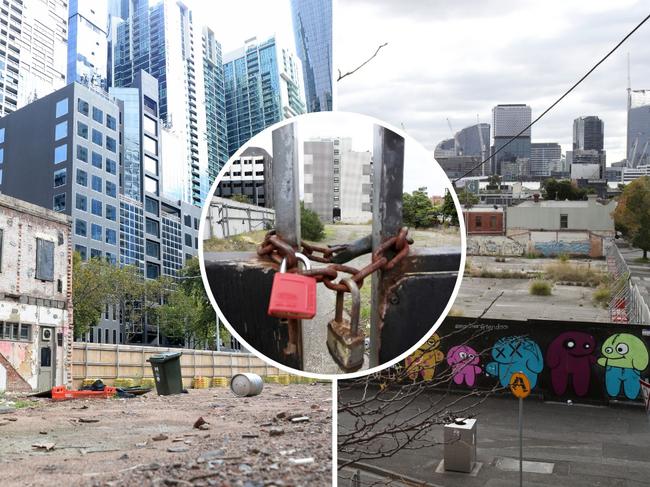
Property
Don't miss out on the headlines from Property. Followed categories will be added to My News.
Melbourne’s planning authorities are preparing to fight empty “zombie” sites as developers battle growing blowouts in construction timelines.
Dud government policies sending confidence in Victoria backwards, workers refusing to return to the office, sky-high material and labour costs as well as interest rates have combined to stall projects across the city — leaving vacant land languishing in some of the city’s most-prominent locations.
RELATED: Melbourne’s best rail lines for home seekers revealed
Aussie suburbs most popular with property investors
Ex-AFL Commissioner hawking Wheelers Hill plaza for $120m
Special rules to stop empty lots being left as a hole in the city’s landscape long term are just weeks away from being enforced in the Hoddle Grid for the first time since before the pandemic.
Backers for the redevelopment of the former home of Goldfingers strip club have until June to start construction before the empty plot is turned into a temporary pocket park.
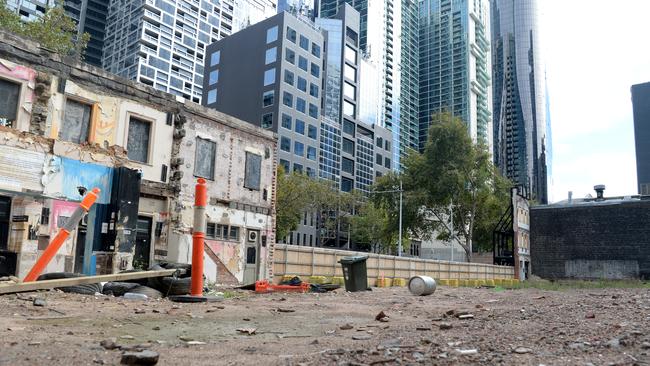
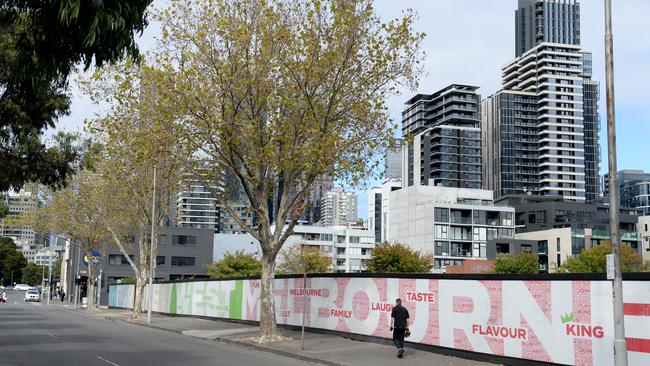
A 22-storey, 88m-tall office tower is slated for the space, but at present the tallest thing beyond the hoarding around the now vacant lot at the corner of Lonsdale and King streets is the historic facade of the Kilkenny Inn — which is being retained as part of the project.
Builder Hickory had a planning permit approved in 2021, but last year began advertising for a joint venture partner to help deliver the site.
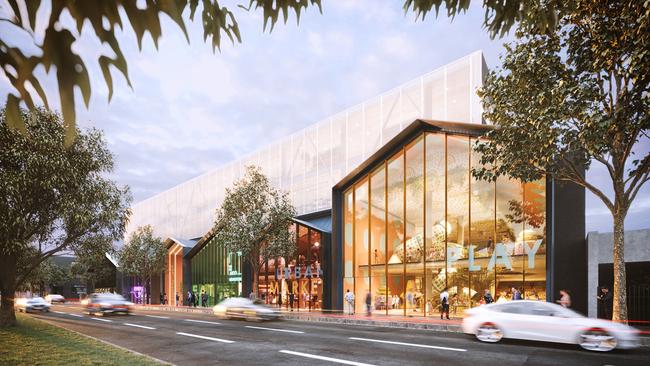
Across the road, an existing building was demolished in 2022 — but there is still no sign of the 40-storey office tower planned by developer V-Leader.
There is another empty block just a few metres away at the corner of Little Bourke and King streets.
In West Melbourne just outside of the CBD, but still on King St, international developer Holder East this week confirmed they are now aiming to commence construction in 2025 on a site that has also sat empty for years.
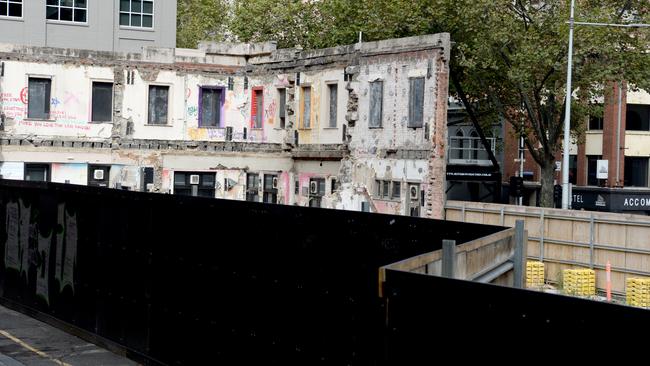
City of Melbourne records show there are 71 projects with planning permits that have yet to commence construction around the city, with 90 buildings and about 17,500 apartments attached to the approvals.
Melbourne Lord Mayor Sally Capp said the council was aware of growing timelines between planning approvals and construction commencing, and said it was largely as a result of increased construction costs and materials and trades shortages.
“The pipeline has definitely slowed in terms of permits moving through to construction and ultimately through to completion,” Ms Capp said.
“We are still actively managing all of those sites because it’s important to us that we don’t have dormant sites; we can’t have zombie sites in the city, because that’s just unacceptable.”
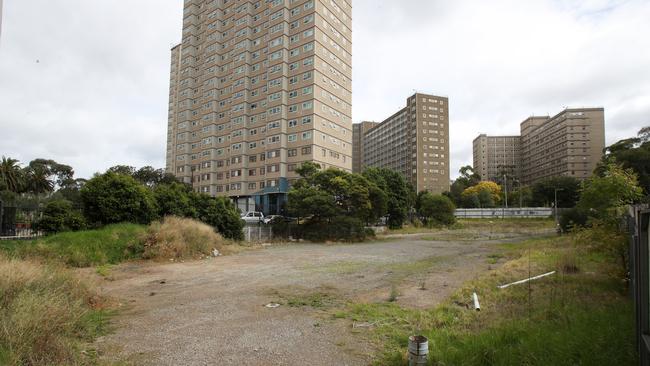
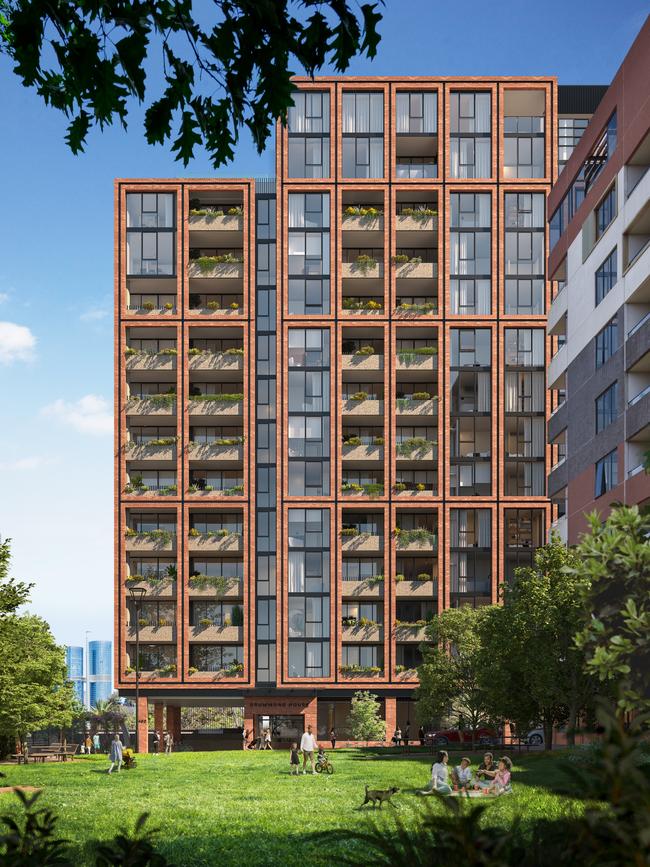
The council now expect the Goldfingers site will be converted to a temporary pocket park in June, with Ms Capp unable to recall the last time the activation clause had been enforced within Melbourne’s Hoddle Grid — though noting it had not been used since before the Covid-19 pandemic.
A spokesperson from builder and developer Hickory, who owns the former Goldfingers site, said they were committed to creating better places for future communities and they were “working closely with stakeholders to better meet current market demands, with a strong focus on the living sector”.
However other addresses around the city fringes have been used as pop-up parks, like the Corkman Hotel site, temporary basketball courts or as artistic spaces.
“But these are only ever short-term measures,” Ms Capp said.
“But we really will have to work with the sector as the impacts on the sector are beyond our and their control.”
Property Council of Australia Victorian executive director Cath Evans said recent surveys by the powerful lobby group found Victoria was the only state where industry confidence went backwards in the past quarter.
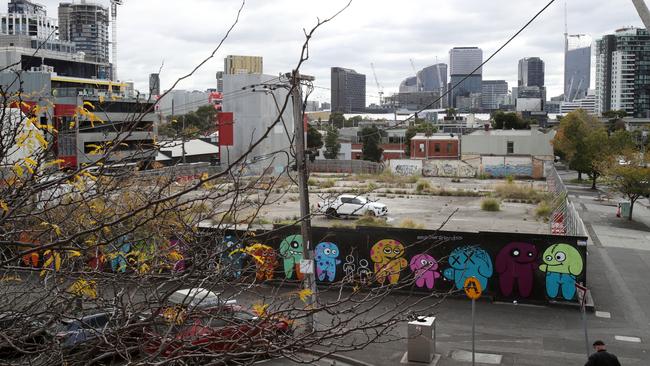
“While vacant sites and under-utilised land are an eyesore and immensely frustrating to see in the midst of a housing supply crisis, it’s the state government’s responsibility to create economic conditions that are conducive to investment and enable projects to stack up,” Ms Evans said.
“The upcoming state budget in May is a critical opportunity for the government to reduce the tax and policy pressure on the industry and incentivise market activation.”
Commercial real estate firm JLL head of capital markets Josh Rutman said developers behind stalled projects weren’t leaving them to linger due to a “lack of desire or conviction”.
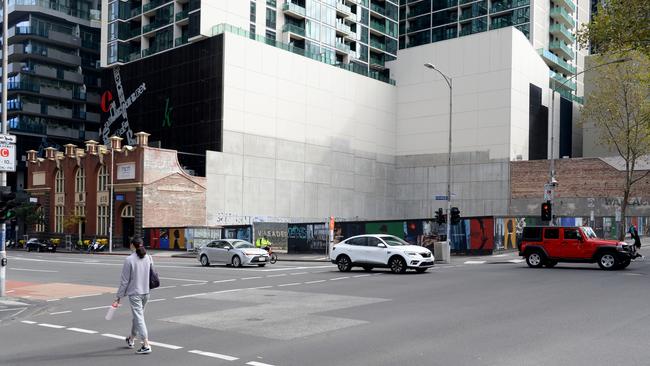
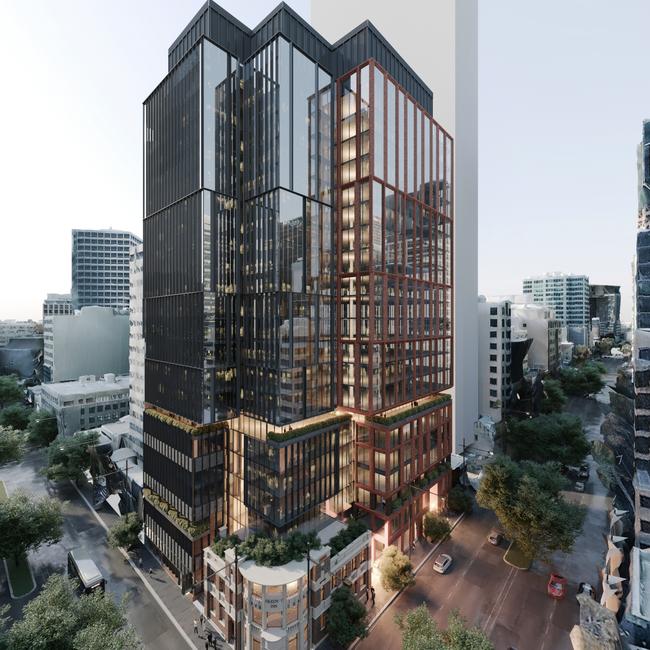
“There are several pressures and constraints which are preventing developers from getting on with the job, and several of them need to be addressed by the state government,” Mr Rutman said. “We need to see more leadership.”
Colliers national director for residential real estate sales Jozef Dickinson said he was finding himself driving past holes in the city’s landscape thinking “could that solve the housing crisis?”
“A lot of these sites were for offices and that will no longer work,” Mr Dickinson said.
“We used to be a destination haven for property investment and now we are looked as one of the most taxed cities in the world.”
There are further blank slates outside the City of Melbourne.
Developer Bensons Group this week commenced sales for a hi-tech apartment complex that will replace an empty block at 482 Drummond St, Carlton. The site is understood to have been vacant since 2008.
Construction could also commence this year for a high-profile empty block opposite the South Melbourne market.
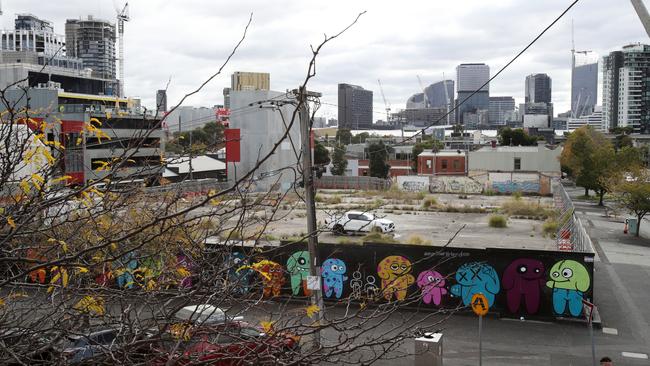
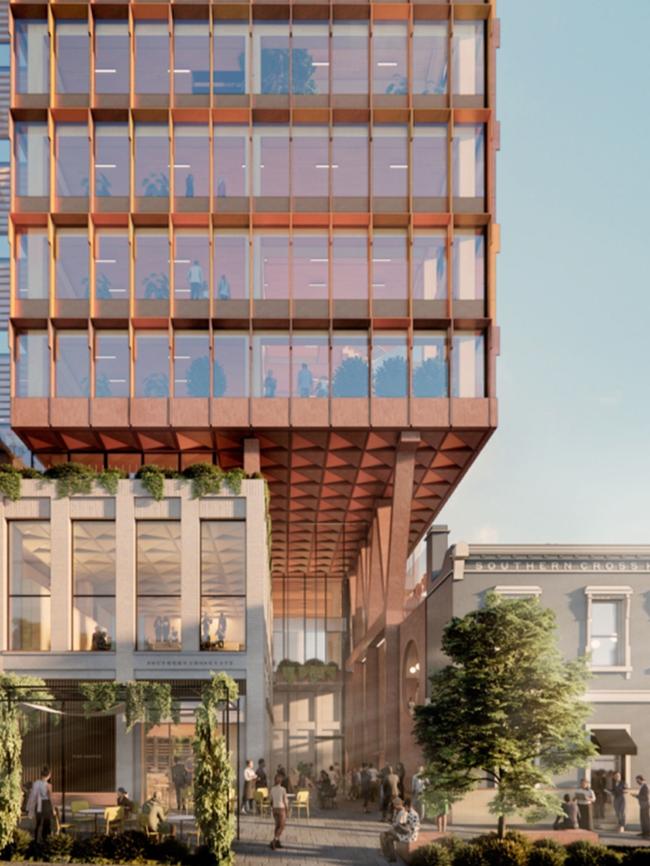
Yesterday GLG Developments boss Simon Langer said he was hoping construction would commence on his firm’s high-profile site opposite the South Melbourne market in 2024.
They are currently awaiting a permit for an amendment to one first issued in 2019, which will increase the size of the project by two storeys and along with 4000sq m of retail at ground level would feature about 20,000sq m of office space.
Port Phillip Council have issued a notice of decision to amend the permit.
“Essentially, it will be a landmark building in Melbourne and one of the latest, state of the art, offices with really high sustainability credentials,” Mr Langer said.
He added that he hoped it would house about 2000 workers and provide a massive economic stimulus the South Melbourne precinct.
WHAT’S CAUSING MELBOURNE BUILDING DELAYS
+ Materials and trades: The cost of materials and trades has stabilised after substantial blowouts in the past two years caused by shortages amid a house-building and infrastructure boom. But with large-scale developments taking years to plan and build, two years of increasing costs has left them struggling for financial feasibility.
+ Work from home: Fewer office workers returning to the CBD has led to lower confidence in new office towers, and has lead to less demand for office space. Without commercial spaces pre-leased, some developers are struggling to obtain finance from banks and other lenders.
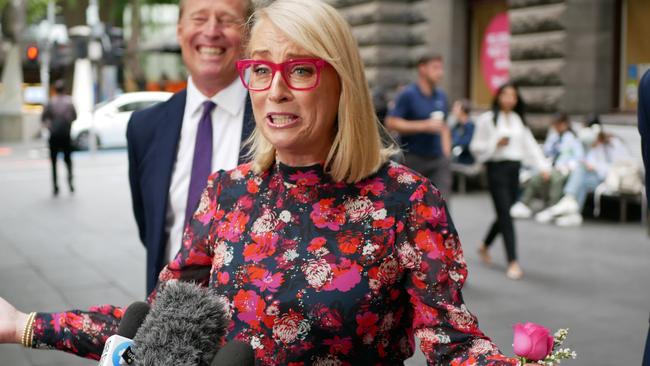
+ Rate hikes: 13 interest rate hikes by the Reserve Bank in the past two years has reduced borrowing capacity for homebuyers and investors. With some priced out entirely, or forced to delay purchase plans, pre-sales for apartments have lagged — making it harder for developers to finance builds.
+ Policies: A range of government policies including additional tax slugs on international investment has sidelined capital sources that have in the past funded substantial chunks of CBD construction.
+ Planning: As some developers seek to swap plans for projects, for example from hotel space to apartments, seeking further approvals and requirements to redraw plans to meet differing standards causes delays.
Sign up to the Herald Sun Weekly Real Estate Update. Click here to get the latest Victorian property market news delivered direct to your inbox.
MORE: Melbourne quarterly median home prices, 95 of the richest suburbs get richer: REIV
Melbourne’s crazy rich mansions: Ritzy real estate that’s could crack house price record
Foreign millionaires and Singaporean homebuyers call Australia home


